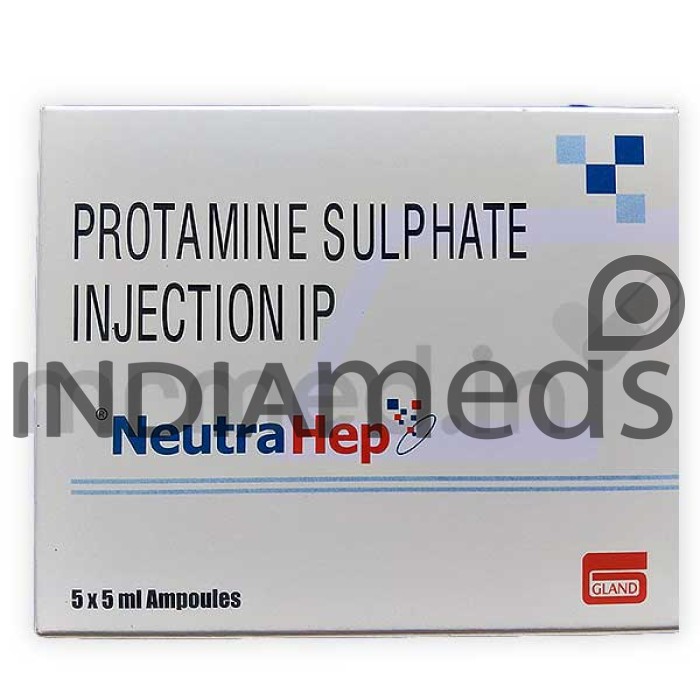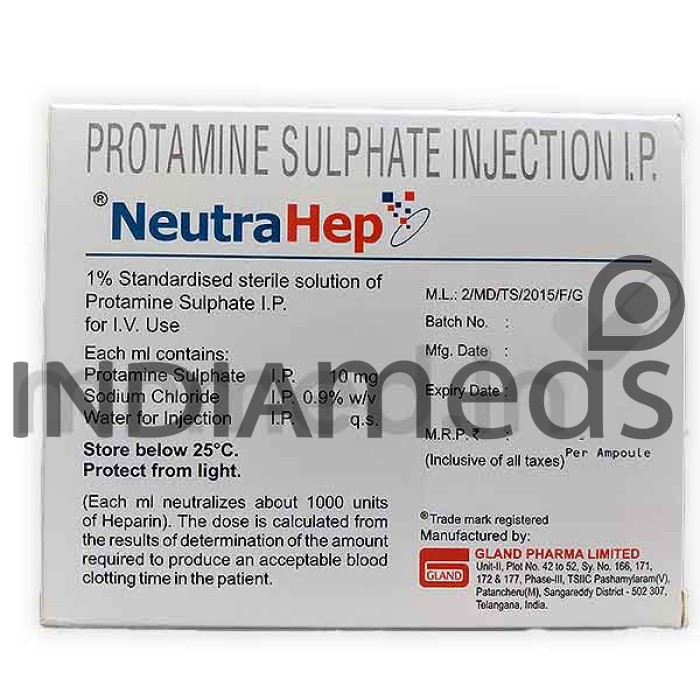Neutrahep Injection is an anticoagulant reversal medication containing the active ingredient Protamine Sulfate. This medication is commonly used as an antidote to reverse the anticoagulant (blood-thinning) effects of heparin, and it is often used to prevent blood clot formation. This drug helps to counteract the anticoagulant effects of heparin. It does not thin the blood itself; instead, it neutralizes the effects of heparin, allowing the blood to clot normally.
This drug is contraindicated in individuals with known hypersensitivity or allergy to it or its component. Before initiating the treatment with Neutrahep Injection, inform your physician if you are allergic to fish, have previously undergone heart surgery, are an insulin-dependent diabetic, or if you are a man who has had a vasectomy or is infertile. It is important to communicate this information to your physician to ensure your safety and appropriate medication use. Do not try to treat the overdose on your own. Avoid taking any additional medications or interventions without medical guidance. The management of an overdose should be under the supervision of physicians.
Patients undergoing prolonged medical procedures involving repeated doses of this drug should be subject to careful monitoring of clotting parameters. If you suspect that you have used more Neutrahep Injection than you should or if you are experiencing any signs of an overdose, it is necessary to take immediate action to ensure your safety. Inform your physician if you are pregnant, breastfeeding, suspect pregnancy, or planning to become pregnant. Please consult your doctor for more advice. This drug is not recommended for children aged twelve years and younger.
Therapeutic Effects of Neutrahep Injection
Pregnancy
If you are pregnant, suspecting, or planning for the pregnancy, report to your doctor before starting the treatment with Neutrahep Injection.
Breast Feeding
If breastfeeding, consult your doctor before starting the treatment with Neutrahep Injection.
Lungs
It is unknown whether Neutrahep Injection is safe for patients with lung problems. Inform your physician if you have lung disease before starting the treatment.
Liver
It is unknown whether Neutrahep Injection is safe for patients with liver problems. Consult your doctor for more advice.
Alcohol
It is unknown whether consuming alcohol interacts with the Neutrahep Injection. Please consult your doctor for more advice.
Driving
Neutrahep Injection is unlikely to impair your driving ability and is safe to operate machinery.
Serious
- Low or high blood pressure
- Shortness of breath
Common
- Flushing, feeling of warmth in the body
- Feeling sick, tiredness
- Injection site reactions (redness, pain, swelling)
Neutrahep Injection works by binding to and neutralizing the effects of heparin. Heparin prevents blood from clotting, and protamine counteracts this by making blood clot more effectively.
Neutrahep Injection is primarily used for reversing heparin's anticoagulant effects and is not used for other medical conditions or purposes.
Neutrahep Injection acts relatively quickly to neutralize heparin's effects, but the speed of reversal can depend on several factors, including the dosage of the drug and the amount of heparin in the patient's system.
Neutrahep Injection is usually administered in emergency situations when there is excessive bleeding or hemorrhage due to a heparin overdose or to reverse the effects of heparin during surgery.
Neutrahep Injection is derived from fish sperm, so individuals with known allergies to fish or shellfish may be at an increased risk of an allergic reaction when exposed to this drug. Healthcare providers should be informed of any known allergies before administering the medication.
Molecule name: Protamine Sulfate | Therapeutic class: Anticoagulant reversal agents |
Pharmacological class: Heparin antagonists | Indications: Treatment of heparin overdosage |







